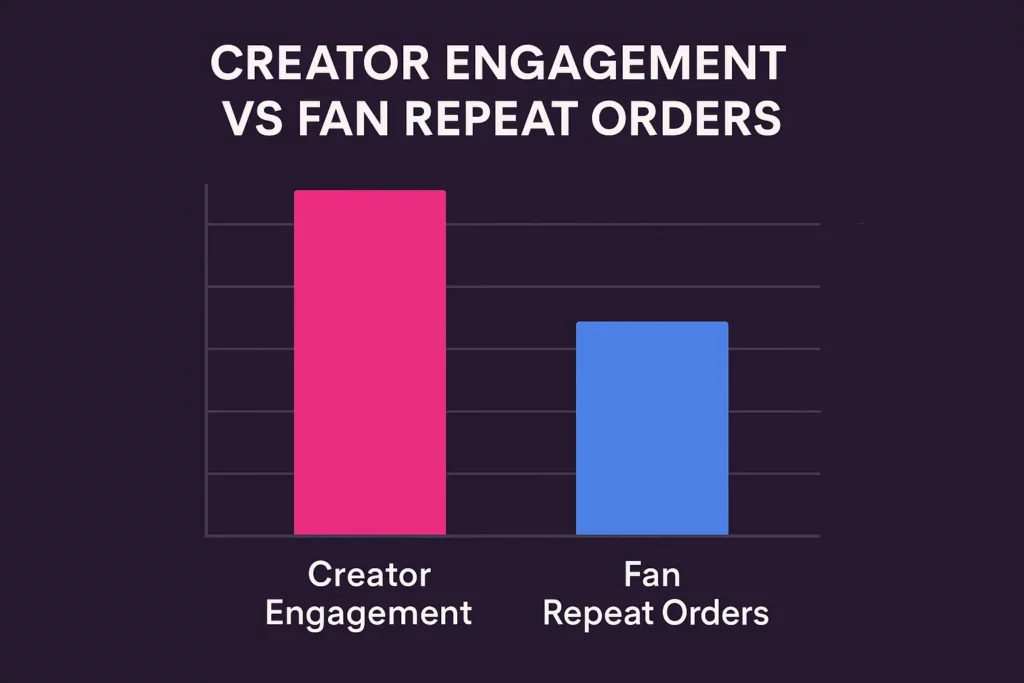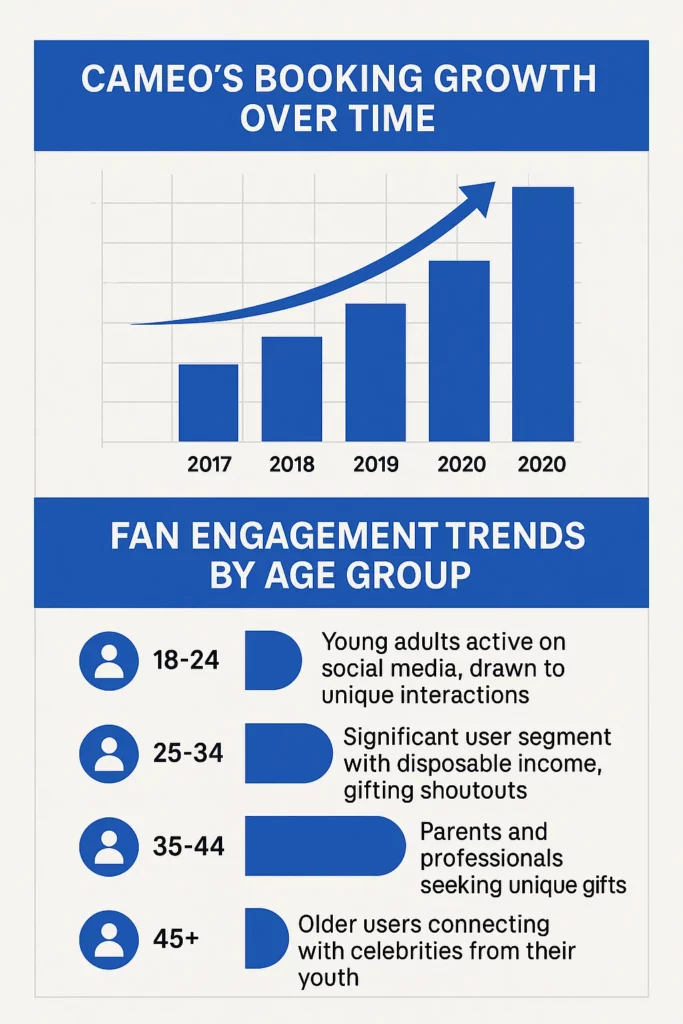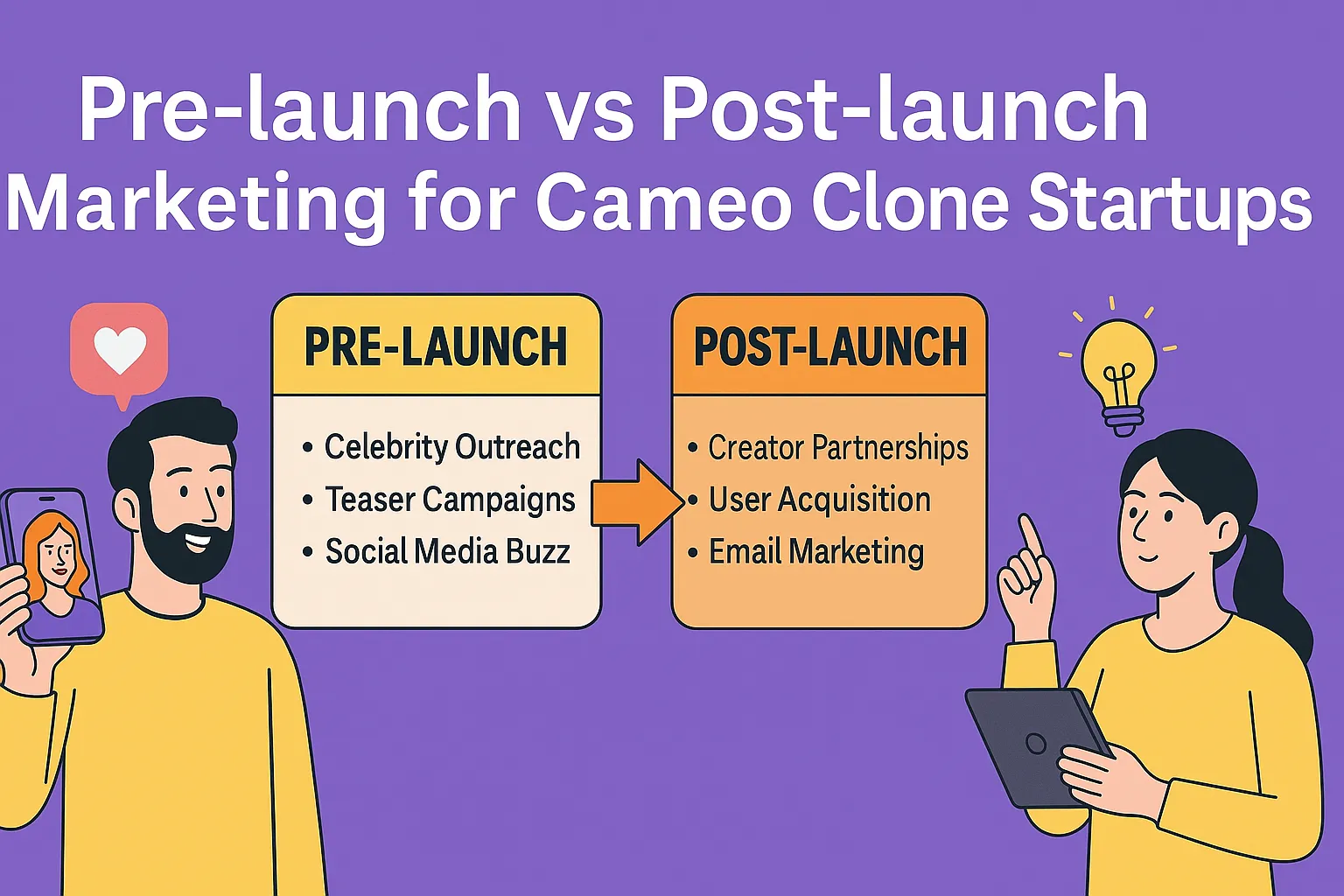You’ve got the idea. An app like Cameo—where fans can get personalized shoutouts from their favorite creators. It’s brilliant, it’s scalable, and it’s totally now. You’ve built the MVP, maybe even onboarded a few influencers ready to record birthday wishes, pep talks, and random roast videos. But then the big day comes… and barely anyone downloads it. Painful, right?
Here’s the thing: no matter how awesome your Cameo clone is, it’s not gonna fly if nobody knows about it. You can’t just build it and hope the bookings will come. Whether it’s getting creators to sign up or fans to start requesting videos, timing your marketing strategy for cameo is everything.
In this blog, we’re breaking down pre-launch vs post-launch marketing moves that actually work for celebrity shoutout apps. And hey, if you’re partnering with Miracuves—the clone app pros—you’ll be starting from a seriously solid foundation.

Why Launch Timing is Everything in Cameo-Style Platforms
Launching a Cameo-like platform isn’t like launching just another social app. It’s a two-sided marketplace—you need creators and users. And both sides are skeptical. They want proof. Traction. Buzz. That’s why pre-launch marketing is your hype machine, while post-launch marketing is your growth engine.
According to TechCrunch, Cameo’s bookings increased by over 350% during the 2020 lockdown, proving that virtual celebrity connections are more than just a gimmick—they’re a booming business. But getting that boom takes a solid marketing runway, not just a launch parachute.
Pre-launch Marketing: Setting the Stage
1. Nail Your Niche and Audience
Are you targeting Gen Z with TikTokers? Sports fans with retired athletes? Pop culture addicts with reality stars? Narrow the focus and speak their language in all your messaging.
2. Get Creators on Board—Early
Your platform is only as good as its talent. Start with micro-celebrities or influencers who already engage directly with fans. Offer them early incentives, spotlight placements, or lifetime perks.
3. Launch a Teaser Campaign
Use countdowns, sneak peeks, behind-the-scenes content, or “mystery guest” reveals on social media. Create FOMO. Make people want to know “who’s coming.”
4. Grow Your Waitlist and Email List
Create a landing page with pre-launch sign-up perks: early access, discount codes, or even exclusive video messages. Bonus if you gamify it with referral boosts.
Post-launch Marketing: Turning Buzz into Bookings
1. Leverage Social Proof
After a few bookings, ask early users to share their videos on social with your branded hashtag. People trust real fans more than ads.
2. Promote Creator Content
Help creators promote themselves. Create pre-made social banners, short preview clips, and sharing links they can post to Instagram, YouTube, and Threads.
3. Push Limited-Time Offers
Run campaigns like “$10 shoutouts all week” or “Holiday specials from XYZ creator.” Discounts tied to time or events create urgency.
4. Track Retention Metrics
Keep an eye on repeat buyers. Who’s ordering again? Which creators are driving the most conversions? Double down on those trends with retargeting ads and feature placement.
Pre-launch vs Post-launch: Side-by-Side Strategy
| Category | Pre-launch | Post-launch |
|---|---|---|
| Objective | Build buzz, validate talent pool | Drive bookings, grow engagement |
| Channels | Social teasers, waitlist, creator outreach | App store, email marketing, push notifications |
| Key Metrics | Sign-ups, creator onboardings | Bookings, retention rate, LTV |
| Budget Allocation | 30% of total spend | 70% of total spend |
| CTA Examples | “Join the waitlist” / “Sign up for early access” | “Book now” / “Get your shoutout today!” |
Mistakes to Avoid
- Waiting too long to market – You should promote before your app is ready.
- Ignoring creators’ needs – Make it easy for them to earn and promote.
- Relying only on paid ads – Organic buzz drives credibility in entertainment.
- Skipping post-launch updates – Feature drops keep fans coming back.
Learn More: Top 5 Mistakes Startups Make When Building a Cameo Clone
What’s Trending Next?
Keep your eyes on:
- AI-enhanced voice messages for deeper personalization
- NFT video greetings tied to blockchain
- Live 1:1 interactions like video chats or group shoutouts
- Creator storefronts with exclusive merch or digital assets
Want to launch your own creator-focused app? Check out our Cameo Clone Development services.

Conclusion
Launching a Cameo clone is like producing a hit show. You need a trailer (pre-launch), a killer premiere (launch), and ongoing fan service (post-launch). When done right, it turns into a flywheel that keeps fans and creators engaged—and coming back.
At Miracuves, we help innovators launch high-performance app clones that are fast, scalable, and monetization-ready. Ready to turn your idea into reality? Let’s build together.
FAQs
How early should I start pre-launch marketing?
Start immediately — with Miracuves delivering your solution in just 3–9 days with guaranteed delivery, you can begin gathering feedback, building anticipation, and refining your pitch right from day one.
What kind of creators work best on a Cameo-style platform?
Micro-influencers and niche creators often perform better because they’re more engaged and accessible.
How do I attract fans in the beginning?
Offer launch-day discounts, feature early buyers, and use creator-led content to spread the word.
Can I launch without any creators signed up?
You can, but shouldn’t. A creator-first approach builds initial trust and demand.
What are the biggest post-launch KPIs?
Bookings, repeat buyers, creator engagement, and referral conversions are key signals of success.
Do I need to keep adding new creators post-launch?
Yes! It keeps your catalog fresh, engages existing users, and draws in new ones.








